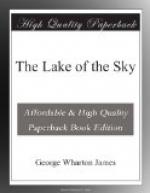to become more surprising with each hour.
The Lake, according to recent measurement, is
about twenty-one miles in length, by twelve or thirteen
in breadth. There is no island visible to break
its sweep, which seems to be much larger than the
figures indicate. And the whole of the vast
surface, the boundaries of which are taken in
easily at once by the range of the eye, is a mass
of pure splendor. When the day is calm, there
is a ring of the Lake, extending more than a mile
from shore, which is brilliantly green. Within
this ring the vast center of the expanse is of
a deep, yet soft and singularly tinted blue.
Hues cannot be more sharply contrasted than are
these permanent colors. They do not shade
into each other; they lie as clearly defined as
the course of glowing gems in the wall of the
New Jerusalem. It is precisely as if we were looking
upon an immense floor of lapis lazuli set within
a ring of flaming emerald.
The cause of this contrast is the sudden change in the depth of the water at a certain distance from shore. For a mile or so the basin shelves gradually, and then suddenly plunges off into unknown depths. The center of the Lake must be a tremendous pit. A very short distance from where the water is green and so transparent that the clean stones can be seen on the bottom a hundred feet below, the blue water has been found to be fourteen hundred feet deep; and in other portions soundings cannot be obtained with a greater extent of line.
What a savage chasm the lake-bed must be! Empty the water from it and it is pure and unrelieved desolation. And the sovereign loveliness of the water that fills it is its color. The very savageness of the rent and fissure is made the condition of the purest charm. The Lake does not feed a permanent river. We cannot trace any issue of it to the ocean. It is not, that we know, a well-spring to supply any large district with water for ordinary use. It seems to exist for beauty. And its peculiar beauty has its root in the peculiar harshness and wildness of the deeps it hides.
Brethren, this question of color in nature, broadly studied, leads us quickly to contemplate and adore the love of God. If God were the Almighty chiefly,—if he desired to impress us most with his omnipotence and infinitude, and make us bow with dread before him, how easily the world could have been made more somber, how easily our senses could have been created to receive impressions of the bleak vastness of space, how easily the mountains might have been made to breathe terror from their cliffs and walls, how easily the general effect of extended landscapes might have been monotonous and gloomy! If religion is, as it has so often been conceived to be, hostile to the natural good and joy which the heart seeks instinctively,—if sadness, if melancholy, be the soul of its inspiration, and misery for myriads the burden of its prophecy,—I do not believe that the vast deeps of space above




